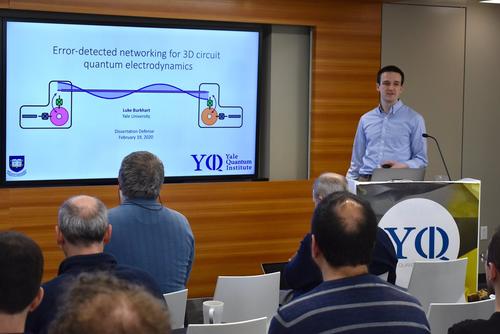
On February 19, 2020 Luke Burkhart successfully defended his thesis: “Error-Detected Networking for 3D Circuit Quantum Electrodynamics” (Advisor: Rob Schoelkopf).
Burkhart explained “Quantum technologies explore exciting and novel possibilities to revolutionize advanced computing, chemical and materials study, and secure communication. These big goals require large, complex quantum machines which can be isolated from the environment, while still remaining controllably interacting within. An approach to managing this complexity is to build small quantum processors, or modules, and network them together, much like a classical cluster computer or server farm. A critical challenge is this approach is building communication links between modules which don’t scramble the information passed through them. My Ph.D. work implements a few complementary approaches for quantum communication between two superconducting microwave modules. Especially important is the capabilities we demonstrate for detecting errors which happen in the communication link, and recovering from them using quantum error correction. We showed that this kind of error correction, which requires sending information in a redundant way, can even outperform simpler schemes which are not protected from errors.”
Burkhart will join Yale Applied Physics as a Postgraduate Associate.
Thesis Abstract: Quantum machines have the potential to serve as groundbreaking tools for scientific discovery in the coming decades. As the complexity of these devices increases, it may be necessary to borrow ideas from complex classical systems, and build them in a modular fashion, with independently designed, optimized, and tested components, networked together into a functioning whole. To build a modular machine from superconducting circuits requires the ability to perform operations between quantum bits housed in separate modules. For this, we must be able to move qubits between modules, or generate entanglement across the network, conveying information in the form of photons. In all implementations to date, photon loss in the links between modules is a dominant source of error, which must be overcome in order to build a scalable modular machine. We demonstrate two approaches for rapid and faithful quantum communication and entanglement between modules in a superconducting quantum network. Encoding information in cavity resonators allows application of strategies for error mitigation in harmonic oscillators to detect photon loss in the communication path. Using a low-loss communication bus, we transfer a qubit in a multi-photon encoding and track loss events to improve the fidelity. Furthermore, generating entanglement with two-photon interference and post-selection against loss errors produces a Bell state with half the error obtained in the single photon case. We discuss several routes towards high-fidelity operations in superconducting quantum networks based off these tools.